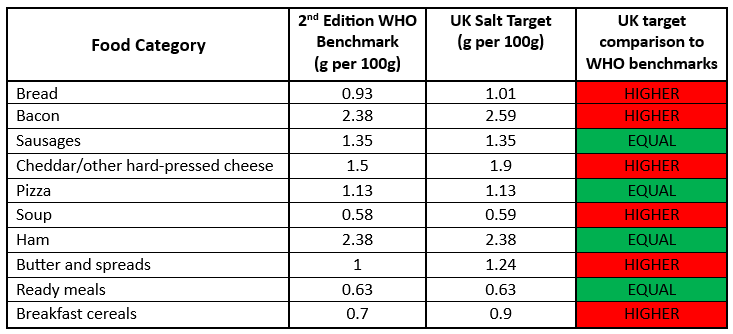World Health Organisation release updated Global Sodium Benchmarks
The World Health Organisation have released the Second Edition of their Global Sodium Benchmarks. These benchmarks, which were originally published in 2021, are intended to be useful for countries in setting national policies and strategies for salt reduction, and should be complementary to ongoing national and regional efforts to set sodium targets.
Read the full document on the World Health Organisation website.
The second edition includes updated sodium targets and now has targets for more than 70 food categories, including some of the highest contributors to dietary salt intake, such as:
- Bread
- Sweet and savoury snacks
- Cereals
- Processed meat
- Ready meals
How do they compare to the UK Salt Reduction Programme targets?
The UK have had their own set of salt reduction targets, initially set up in 2006. These have since been reviewed and expanded a number of times, with the latest set due to be completed by the end of 2024.
In many respects, the Global Benchmarks are more challenging than the UK national targets, with 49% of the UK targets exceeding the new Global Benchmarks for corresponding categories.
The table below shows a comparison of the 2nd Edition WHO Sodium Benchmarks with the UK Salt Targets in the UK’s top 10 contributors to salt.
Whilst the UK have a comprehensive list of salt reduction targets, there are many foods which continue to be omitted from the programme, including popular everyday food items that often contain hidden salt, such as:
- Nut butters
- Various categories of cheese
- Spice blends and seasoning mixes
- Soy sauce
- Olives and sundried tomatoes
- Pickles and fermented foods
- Processed fish and seafood
Sonia Pombo, Campaign Lead at Action on Salt, says “The UK Salt Reduction Programme has been a successful strategy to lowering the UK population’s salt intake and preventing subsequent death and suffering from heart attacks and stroke. However in recent years, progress has stalled and is now in urgent need of resuscitation. As we approach the end of this latest wave of salt reduction targets, we hope the new Government will breathe new life into its flagship reformulation programme, and reclaim the throne as world leaders in salt reduction once more”.



